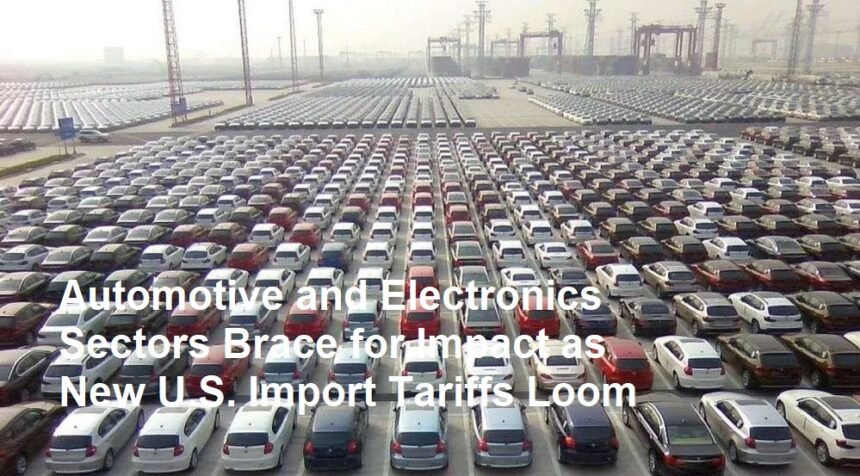In a move that is sending shockwaves through global trade, the United States government has announced a series of new import tariffs set to hit the automotive and electronics sectors hard. The tariffs, which are expected to take effect later this year, have already raised concerns among manufacturers, suppliers, and industry analysts about the potential disruption to production lines, supply chains, and consumer prices.
According to preliminary reports, the new tariffs will increase the cost of imported components and finished products by up to 25%. This significant rise in import duties is aimed at protecting domestic industries and reducing the trade deficit. However, critics argue that the measure could have unintended consequences, particularly for sectors that are heavily reliant on global supply chains, such as automotive and electronics.
Impact on the Automotive Sector
The automotive industry, which is a major pillar of the U.S. economy, is particularly vulnerable to changes in trade policy. U.S. automakers depend on a steady supply of imported parts—from semiconductors and steel to specialized components—manufactured overseas. With the imposition of the new tariffs, companies are expected to face increased production costs that may force them to raise vehicle prices. This could lead to a reduction in consumer demand and potentially slow down overall industry growth.
“Modern automobiles are a complex assembly of parts sourced from around the world,” said Jonathan Myers, an automotive industry analyst. “The new tariffs will disrupt this finely tuned supply chain, increasing costs for manufacturers and, ultimately, consumers.” Manufacturers are already considering strategic adjustments, such as reconfiguring supply chains and exploring alternative sourcing options. However, these efforts require time and significant investment, and there is no guarantee they will fully offset the additional costs imposed by the tariffs.
Challenges for the Electronics Sector
The electronics industry, another major economic driver, is also expected to suffer under the new tariff regime. Electronics companies heavily rely on global manufacturing networks, particularly in Asia, to produce everything from smartphones and computers to advanced consumer electronics. The increased tariffs are anticipated to affect both raw materials and finished products, leading to higher prices and reduced competitiveness in the U.S. market.
Industry experts warn that these tariffs could lead to a ripple effect throughout the electronics supply chain. “Electronic devices are built on precision components that are often imported from several countries,” explained Linda Carter, a technology market strategist. “An increase in tariff costs will not only raise prices for end consumers but also squeeze profit margins for manufacturers and disrupt the careful balance of international production.”
Moreover, with technology evolving rapidly and consumer demand for the latest gadgets high, any delay or disruption in the supply chain could cause significant setbacks in product launches and innovation cycles. This slowdown in technological progress might diminish the United States’ competitive edge in the global electronics market.
Broader Economic Implications
The repercussions of these new tariffs extend beyond just automotive and electronics sectors. With both industries being integral to the broader economy, higher production costs could lead to increased prices across a range of goods and services. This, in turn, might contribute to overall inflationary pressures, reducing consumer spending power and potentially dampening economic growth.
U.S. trade policy experts point out that while the objective of protecting domestic industries is understandable, the tariffs might inadvertently harm them by increasing input costs and stifling innovation. “There is a delicate balance between protecting local jobs and maintaining competitive pricing,” noted Dr. Karen Lee, a professor of international trade at a prominent university. “If tariffs are too high, they can push companies to relocate production overseas, undermining the very goal they are meant to achieve.”
Looking Ahead
As the implementation date of the new tariffs approaches, companies in both sectors are scrambling to mitigate potential damage. Some are already in discussions with policymakers to seek clarifications and possible exemptions, while others are accelerating efforts to diversify their supply chains. Nonetheless, the uncertainty surrounding the tariffs has created a climate of caution in the marketplace.
In conclusion, the new U.S. import tariffs are poised to have a profound impact on the automotive and electronics sectors. With increased production costs likely to translate into higher consumer prices and potential disruptions in global supply chains, both industries face an uphill battle in maintaining their competitive edge. As stakeholders brace for these changes, the coming months will be critical in determining how effectively they can adapt to an evolving trade landscape.













